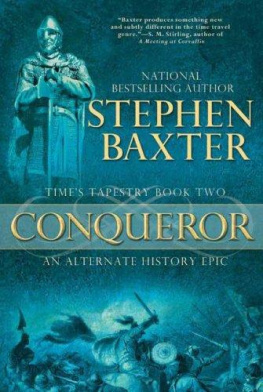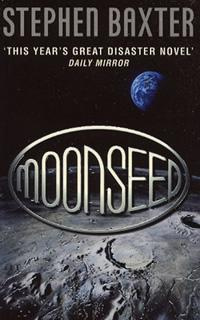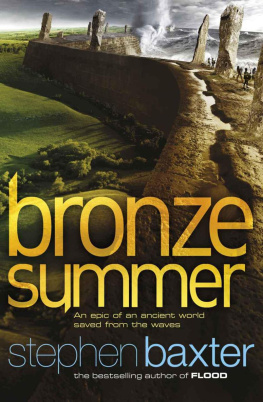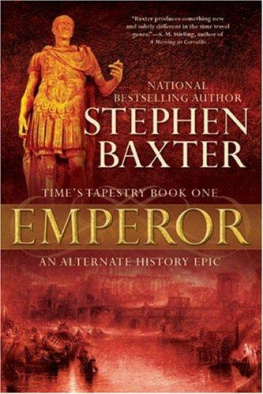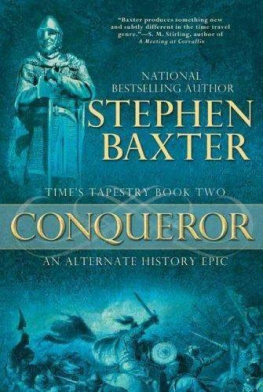IX
As evening fell the comet, suspended in dark northern skies, was brighter and more startling than ever.
While the novices slept in a stable in the Anglish village, the four guests were to stay the night in the fort, Ambrosias insisted. He prepared a meal. Eat, drink, he said. A Roman is nothing if he is not hospitable. He shuffled around with a plate of cut meat and a pitcher of ale. Of course I am grateful to my new Anglish neighbours down the hill, but I wish they could lay their hands on some good continental wine rather than this filthy German ale. Do you know, I tried to grow some vines here at one time, up against the southern wall of fort. Withered and died, the first hard winter. Ah, well! ...
Ambrosiass four guests, Ammanius and Sulpicia, Ulf and Wuffa, reclined on couches. This was the Roman way to take your meals, lying down. They were in a room carved out of the ruins of the old forts principia, its headquarters building. It was a little island of Rome, with mosaics on the floor, frescos, crockery and cutlery, amphorae leaning against the walls of a minuscule kitchen. The floor was heaped with scrolls and wood-leaf blocks, the walls crowded with cupboards. The principias original roof was long gone, but this one section had been roofed over by mouldering thatch.
Everything was worn and old, the pottery patched, the cutlery sharpened so often the knife blades were thin as autumn leaves, and the room was a mouth of dust and soot.
Ammanius quickly turned to the subject of Isolde. Do you know of her? If she ever existed
Oh, she existed, said Ambrosias. And Im the living proof!
You?
I am a descendant of Isolde, Ambrosias said. And therefore of Nennius, her father. I am the grandson of the grandson of the son of Isolde, in fact. And since she was born in Rome, as was her father, then I am a Roman, by descent. He winked at Wuffa. The Last Roman. Thats what you Angles say of me, isnt it?
It would do Wuffa no good to point out the difference between Angles and Saxons, so he kept his silence.
Ammanius prompted, And the story of Isolde?
It had happened nearly two centuries ago, Ambrosias said, in this very fortress. Isolde, then a young girl heavily pregnant, had been hauled all the way here from Rome by her own father, for purposes of his own. Far from home, Isolde had given birth, to the first of a line of five males that would eventually lead to Ambrosias himself.
And as she was in the pains of labour, she began to speak: to gabble in a tongue that was alien to herself and her father.
Ammanius was tentatively interested. She spoke in tongues, then. It is a common miracle. Did she speak of the Christ?
Oh, she mentioned Him, Ambrosias said. But what was miraculous about it was that the tongue she spoke was German.
Wuffa could see that that detail jarred with Ammaniuss notion of what constituted a proper Christian miracle. But it intrigued Wuffa, for to him it made it seem more likely that something remarkable had happened, that this hadnt been a mere plague fever. What possible insanity could cause a Latin-speaking woman suddenly to spout German?
Sulpicia asked, And did she speak of the future? Was it really a prophecy?
Oh, yes, Nennius and the others with her recognised it as such immediately. They wrote it down, and it has been preserved by my family, in this place, ever since.
Ammanius pressed, What did she say?
Ambrosias sighed and gulped down a little more Anglish ale. Well, Ill tell you. Tomorrow we will discuss the past and the future and similar nonsense. But for now let us talk of other things. I am starved of educated conversation, stranded here among illiterate Germans. You are tired - or if you arent, I am - and most of us are a little drunk on this scummy ale, I suspect. He eyed Ammanius when he said this, and the bishop glared back.
Ambrosias turned to Ulf and Wuffa. From the moment they had met he had seemed far more interested in the two young men than in the bishop or the girl, although there was no trace of Ammaniuss lasciviousness in him. Ambrosias asked where the two of them were from, and they tried to explain, though their lack of a common geography was a problem: to Ambrosias they were both simply barbarians from beyond the old empire.
And now you are here, Ambrosias said, on the west coast of Britain, so far from home.
My people came to Britain, Wuffa said, because of the sea. So my father told me. Every year the tides came higher. The beaches and cliffs eroded away. We were forced to retreat from our farms, which became waterlogged. But there was nowhere for us to go, for the land was full.
And so you came across the ocean. The sea rises, and we petty humans must flee. Before such forces, the coming and going of empires seems trivial - dont you think? But there may be deeper patterns yet. Ambrosias leaned close to the two young men, peering into their faces. I once met an old man, a poor Briton fleeing west from the Angles, who told me of an ancient legend - it must date back thousands of years if it is true at all - that once you could walk across the ocean, or rather the floor of what is now the ocean. But the sea rose up. Sometimes, if you dig in the exposed sands on the coast you will find reindeer bones, even a stone tool or two. Do you think that we are all one, we people of the lands surrounding the ocean, that in a sense you are not migrants, you have simply come home?
The idea was astounding to Wuffa. But how you could ever tell if that was true?
Ammanius grunted grudging approval. An intellectual answer. I could make a scholar of you, wolf-boy, given time.
Ulf, always more earthy than Wuffa, was uninterested. We have no legends of drowned lands. My people are warriors.
Ah, warriors, said Ambrosias. The world is never short of warriors! When I was an infant my father presented me to the greatest warrior of all. Have you young blades ever heard of Artorius?
They had not. Ambrosias seemed shocked.
Ammanius told them that as the German immigrants expanded from their coastal footholds and conflict spread across the island, the British found a general in Artorius, who had the authority to work across the boundaries of the province-states and organise significant resistance. He won a string of victories. Artorius may have been a nickname, meaning the Bear man, perhaps a reference to his size. He was said to be the nephew of one of the last Roman commanders to have stayed at his post in Britain.
All this was a century after the Roman severance, Ammanius said. Artorius won peace for a generation. But all he really secured for his people was time.
Wuffa asked, So why would this Artorius come here?
He retired here after a last battle, Ambrosias said. Already an old man he was gravely wounded - worn down by the treachery and cowardice of his own men as much as the enemys efforts. He died, here at Banna - on the Wall, the greatest monument of the empire to whose memory he devoted his life. He was misty-eyed now. In another age they would have built him an arch here to rival any in Rome! And I, a child, was presented to him. He ruffled my hair! Here. He knelt stiffly, presenting his bowed head to Wuffa. Touch my scalp. Go on!
Wuffa glanced at the bishop, who shrugged. Wuffa laid his hand on the old mans head. His skin felt paper-thin, stretched over a fragile skull.
Always remember. Tell your children! ...
After more conversation of this sort Ammanius stood and stretched. Youve worn me out, sir, with your kind hospitality, he said in his dry way.
Sulpicia stood. She wasnt about to be left alone with Wuffa and Ulf, even with the old man as chaperone. I will bid you goodnight too. And, impulsively, she planted a light kiss on the crown of the old mans head.

